Pinto: Living as other: On being Jewish in Turkey
May 7, 2014
“What’s your name?”
“I’m Yoni.”
“That doesn’t sound Turkish. Where are you from?”
Every time I meet a new person back home, this is the dialogue that takes place.
Am I Turkish? Definitely. I have lived in Istanbul my whole life, born and raised. It’s one of the things I’m proudest of, even if I didn’t have any control over it. It is my favorite city in the world. It’s amazing, historically and culturally, but it’s also a special place for me — it’s home.
You might ask then, if I’m as Turkish as I say I am, why doesn’t my name sound Turkish? Why don’t I have a Turkish name? I’m also Jewish.
I’m tremendously proud to be both Turkish and Jewish — both are parts of my identity I hold high. They’re things I consider more important than many other things that define me. In my core, when looking past all else, what I am is a Turkish Jew. Those are the two parts of me that have defined what values I consider important throughout my life. My Turkish identity has taught me to be kind and compassionate, respectful, warm to others around me. It has also taught me to be passionate about my ideas and my beliefs. My Jewish identity, on the other hand, has showed me the importance of community, family, tradition. It has taught me to appreciate the history that has led me to each moment, and how I can make the most of it. All of these values are immensely important to me and how I make decisions every day.
But with everything considered, with everything my identity has contributed to me, there remains one truth that can’t be denied: Being a Jew in Turkey is difficult, it’s exhausting, sometimes it’s even scary.
First, numbers: There are only around 17,000 Jews in Turkey, a country with a population of around 80 million. By contrast, the US contains 5.3 million Jews out of a population of 317 million. Although as far as numbers are concerned, Jews are most definitely a minority, there is a significant Jewish population all over the United States. In America, wherever you go, you can find Jews. In Turkey, Jews are rare and concentrated in one city. As a Jew, you feel lost in a sea of other people.
Because there are so few Jews in Turkey, almost nobody knows any Jews personally. In such an environment, anti-Semitism spreads easily. Since the average citizen doesn’t know any Jews, it’s easier to influence his thoughts about them: The prime minister gets into a shouting match with his Israeli counterpart, or he yells about Israel on television. Anti-Israeli sentiment quickly turns into anti-Semitism. A Turkish newspaper, the Star Daily, reports about how Freedom House lowered Turkey’s press freedom score to “not free,” and instead of justifying it by the number of journalists in our prisons (which is higher than any other country in the world), the newspaper justifies it by saying Freedom House is run by Jews. People are influenced, manipulated, into believing that all of Turkey’s problems are caused by the Jewish diaspora.
The thought process goes something like this: “If these people are doing bad things for Turkey, they can’t be Turkish.” Jews become alienated, singled out, from the rest of the Turkish population. Most of them don’t even know any Jews — all they know is that the Jews are different, that they’re bad for them.
It’s important to say that these kinds of interactions don’t manifest themselves in interpersonal relationships, at least in my personal experiences. I have been lucky to surround myself with the exceptions in this environment. But even if I do manage to show the true “Turkish Jew” to the people who are around me, the broad picture doesn’t change. In the eyes of the law, everybody’s equal. But in practice, you know that you’ll always be an other to the general Turkish population, that you will never be Turkish enough, even if you might have more Turkish heritage than everybody else, that you will never be able to be elected into any office, that you will always be different. These are things that stick with you, no matter what.
Again, I love my country. I love the people. I know that not everybody in Turkey shares these views. But this is the experience I have gone through as a Turkish Jew. This is why Jews are leaving Turkey in large numbers. This is why I’m unsure of going back home after I graduate. This is why we need to change things. I just don’t know how.
Yoni Pinto is a Weinberg freshman. He can be reached at [email protected]. If you want to respond publicly to this column, send a letter to the editor to [email protected].


